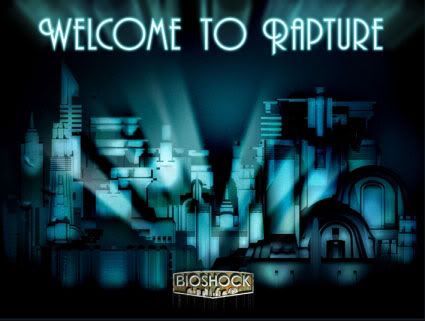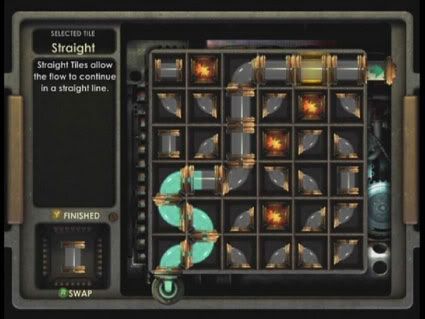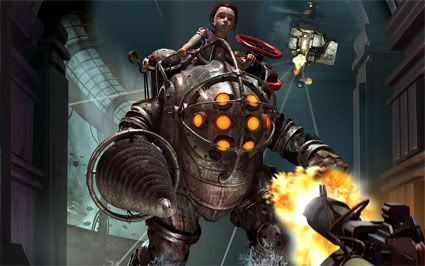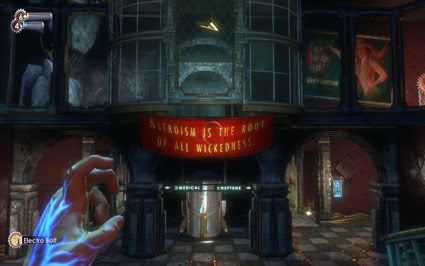
Hope you survive your visit.
Like my review of Mass Effect, this is in preparation for my acquisition of Bioshock 2, which was released in stores yesterday. Now, I know a whole lot of people are all over this sequel and you’ve probably already moved on yourself, but until I too have gained enough of that arbitrary capitalist-fuel bank-managed digital data called “money” – because, let’s face it, most wealth is measured in 1s and 0s than it is in bullion these days – I’m still playing older games since I can’t afford the new ones. Except Star Trek Online.
Yes, I know that makes me dull, shut up already.
Our story begins in 1960 with a spectacular plane crash. The protagonist, Jack, is the only survivor. Amazingly, at no point does the perspective shift away from that of Jack, keeping us immersed in the experiences of living through a traumatic event, struggling to survive in the vastness of the ocean before we pick up anything resembling a weapon and the discovery of the vast underwater city known as Rapture. Once we descend into the hidden metropolis, accompanied at first only by the chilling introduction of the city’s themes and philosophy by Andrew Ryan, we are confronted with an environment both alien and familiar. There’s something special about Jack, and only by surviving the experience of wandering through Rapture and encountering its inhabitants will the truth be revealed.
Stuff I Didn’t Like

What? Pipe Dream? Rapture runs on Windows 95?
- I know the game has a water theme going on, being at the bottom of the ocean and all, but circuitry is still circuitry even in a vaguely steampunk setting. Did the hacking system really need to be a clone of Pipe Dream? I mean it’s nice for all of the gibbering Splicers and menacing Big Daddies to wait for me to finish rearranging the flow of water (or whatever it is) to hack a turret so it’ll tear them to shreds, and it looks as good as anything else in the game, but considering how much of the game is focused on the action, including this kind of simplistic puzzle-solving is, to me, a little cognitively dissonant.
- Speaking of action, this game is billed as a ‘spiritual successor’ to System Shock 2. I loved the hell out of System Shock 2, and not just because it was an immersively atmospheric shooter. There were elements of role-playing as well, from the beginning where you picked your branch of service to the specialization that came from collecting cybernetic modules. If you wanted to use the BFG 9000, and weren’t a Marine, you’d better’ve hoarded those modules since the start, mister. In BioShock, on the other hand, Jack can pick up and use any weapon or psi-power (“Plasmid”) he finds in Rapture no matter what it might be. A Chemical Thrower is every bit at home in his hands as the magical heat-seeking bees that live there after you pick up a particular Plasmid. It keeps the game flowing in an action-related sense but it could have added another layer to the game.
- The Vita-Chambers that restore you to life are another hold-over from System Shock 2. However, in the previous game you had to find missing components on the level in question and install them at a specific location in order to essentially unlock a spawn point. In BioShock, Vita-Chambers are sprinkled liberally throughout Rapture, and using one doesn’t cost you a dime, while bathroom stalls charge you for their use. In an objectivist utopia, you’d think that a machine that does something so otherworldly as bring the dead back to life would cost you a fortune. But no, you just pop out of the thing after that Big Daddy stomped your face into the floor.
Jack: “MY TURN NOW, BITCH!”
Me: “Okay, now I’m kinda bored.” - There’s a moral choice system at work in the game, but your choices are “Savior of the Universe” and “Absolute Bastard.” There’s no room for you to be a normal, flawed guy just trying to survive.
- The third act of the game is kind of disappointing, for me.
Stuff I Liked

“Why’s he shooting at us, Daddy? I just wanna play with him!”
- The inhabitants of Rapture are a varied and interesting bunch. It comes to a point where you can pick out what’s waiting for you around the corner if you listen for a moment. The sound design in BioShock is top-notch. Like the aforementioned predecessor, a big part of the atmosphere is in the sounds made by the structures and creatures. Also, like Fallout 3, there’s some soundtrack dissonance to be had as something swing-era and gentle plays while you’re backing away from the Splicer hurling obscenities and bullets at you as you attempt to defend yourself. And the occasional public announcement really adds to the somewhat disturbing atmosphere.
- The undercurrent of Ayn Rand’s philosophy running throughout the game makes the experience even more interesting. I’ve been trying to avoid spoilers, so I’ll just say that this feeling lasts for a very long time, up to and including your encounter with a pivotal character in Rapture’s history. After that encounter the game moves into its third act which, as I said before, kind of let me down.
Stuff I Loved

Rapture itself makes up for a lot of shortcomings.
- I’ll begin my gushing with the art direction. A lot of games rendered for current consoles look good, but BioShock‘s setting, characters and sequences all feel remarkably fresh and hauntingly nostalgic at the same time. There’s an old-fashioned sensibility about Rapture, the clothes people wear there and even the weapons you pick up that really reinforce the period feel of the game.
- The storytelling in this game is outstanding. From the overall arc of the plot (even if it does waver a bit at the end) to the characterization of major NPCs, the game is written extremely well. If the art and sound design weren’t enough to draw people in, the plight of the people who speak with Jack and the emotions they convey drive the point home and yank us into the experience.
- Jack begins as your standard-issue silent protagonist. But the more we get into the game, the more we realize that he is a fully-realized character, and there’s that one sequence that helps us feel moments hesitation and even fear despite facing down Big Daddies and surviving quite a while in Rapture’s hostile environment. He many never say a word, but we get to know Jack pretty well, and our connection to him begins to extend beyond his role as a player surrogate.
- The Big Daddies and Little Sisters. Not only are these folks icons for the entire game and its dissonant themes and mood, but they’re extremely well realized characters that, again, need very little dialogue. We never see the face of a Big Daddy, as they convey emotion through body language and whale-like sounds alone. Little Sisters, barefoot in pretty dresses, are all the more menacing for their unassuming appearance, especially when they start screaming for our blood when we open up on their colossal protectors. We need them, though, and the mysterious substance they collect from the dead, and as much as you might hate them and choose the ‘Harvest’ option every time, seeing them sobbing over the inert body of a Big Daddy, for me, tends to give a moment’s pause. How much is survival worth? Is it enough to merely survive, or should we struggle to do something more, to be better than an animal vying for the right to exist? It’s a question that is posed to the player without a single mention of such a line of thought in any of the written or spoken messages in the game. Then again, that could just be me.
Bottom Line: I adore BioShock. In spite of the things I don’t like about it, the little bits from System Shock 2 that could have made the game even better, this is a solid, well-produced and fantastic shooter that manages to be more than just another run-and-gun title. It’s got something to say. It’s actually about something. And that’s more than most shooters could ever hope to claim.
If you haven’t bought it already, it’s worth the money.


I should make a note here that I enjoy your review style. I know it’s not entirely unique, but dislike/like/love is a nice trifecta.
Also: the sound design in the second game continues to be mind-bending.
Water will drip in patters and spatters on the floor, and it sounds great.
Then you go and stand under it — and you hear the ping pang sound of it hitting your tin/aluminum/whatevermetal shell. It’s spectacular. I was playing it last night and just stopped for a minute to simply *listen* to Rapture. Not sure an other game has really given me that sense of immersiveness.
— c.
I have yet to finish this game. Why?
Frankly, it scares the hell out of me.
No, I’m serious. I have never been terrified while playing a game the way I am while playing BioShock. There were nights where I would wake up in a cold sweat on the verge of screaming because something that happened in-game sent my subconscious on a self-destructive bender like nothing I’ve ever before experienced.
This is why there are now house rules concerning when I’m allowed to play it and when I’m not. True story.
Don’t worry, Amanda, I don’t do scary games either. I just watch someone with more balls play them so I can get all the story and less of the terror. So, yeah, I haven’t played this one either, but it still fascinated me.
You didn’t like the pipe dream section of the game? It became super easy once you did all your research. I enjoyed it as a nice break from the combat.
One of the great parts of the game was not only the immersive setting but the fact that Rapture was almost fully realized around you. It wasn’t just an “abandoned base full of secrets and mutants” like you see in other games. You got a brand new experience and everything meshed together. I also loved picking up the auto diaries, since these helped explain more of the back story to the game.
I loved the hacking system a lot, thanks to it being a Pipe Dream clone. Hacking in Bioshock 2 is arguably a lot better, though.
Also, Little Sisters are 500x cuter in the sequel, too, and have -awesome- commentary.
@John says smart things — Rapture is a fully realized entity. They spent time on it. If the rumors hold true, they did a *400* page story bible for that damn game. Holy shiznit.
Bioshock 2 carries on this tradition (everything has its place, you get new glimpses of the city).
— c.